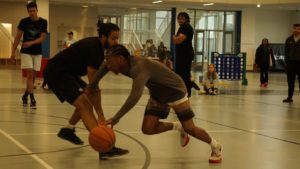Central Authors Speaks On Student Parents
September 16, 2019
College can be challenging enough for students who do not have any dependents. For those who have to work, support a family and go to college, the road to getting a degree is significantly harder. This is the idea that Sociology professor A. Fiona Pearson explores in her new book, “Back in School: How Student Parents are Transforming College and Family.”
Last Wednesday, Pearson had the opportunity to share a detailed look at her recent publication at the latest Central Authors episode. From exploring the facets of her research to providing specific perspectives from her many surveyees, Pearson discussed the livelihoods and issues dealt with by the student parent demographic at Central.
Since 2007 when Pearson began her extensive train of research, many student parents have shared their experience in navigating campus and home life with Pearson. Through her book, Pearson’s goal was to give color to the transparent presence and struggle of this group of students over the past decade.
Pearson conducted her studies on parents of children under the age of 12. These student parents had many different backgrounds, financial standings, family sizes and overall outlooks on education.
“I asked student parents about their expectations in terms of ‘What is the purpose of an education,” Pearson said. “‘What do you expect out of your education? What is the role of higher education? What makes for a good student?’”
Pearson’s book offers many hidden examples of struggles that student parents face.
“We need to think about these things in the context of the larger social and institutional policies that are in place,” Pearson said. “What are the possible obstacles for students? Money is the big one. I have a colleague over at Southern who shared with us at a meeting recently that in the 80s when they were in school they could work a summer job as a lifeguard and you can make all your tuition that summer. That world no longer exists.”
Although Central doesn’t have a high tuition price in comparison to other four-year institutions, there are students that need to use this money to sustain not only their lives, but their family’s lives. Money has always been a key issue for the parents of students, as they are usually the ones dealing with a good amount of their child’s tuition payment. But a student parent has to deal with overlapping issues in this regard. Pearson pointed out that Pell grants no longer cover a full year’s worth of tuition, and now student parents need to take out loans to pay for their own education, while at the same time trying to balance a certain quality of life for their children.
“Those students who were older who talk about interactions with their professors, some of them were very accommodating, some were not so,” Pearson said. “And those who were older were fearful of what one student called ‘playing the parent card’. ‘I’m not looking for sympathy, I’m just looking for understanding.'”
“And then academic norms,” Pearson said. “I was just in a Dean’s meeting and a question was asked. ‘Do we have a policy at Central regarding children in the classroom?’ And we don’t have a policy. Should we have a policy in place? It could be distracting to have a child in class. But the reality is we don’t have institutional resources that allow for any other choices.”
Although most of her presentation spoke about the thoughts and concerns of the students she interviewed, the main issues that she brought to light were that of the constrictive general education system and the policies that most prominently infringed on student parents’ education as a whole.
“In the state of Connecticut, if you are receiving cash welfare benefits or the childcare systems welfare, education does not count towards your work participation goals,” Pearson said. “I had students who I interviewed who were told by their case manager you have to make a decision. You’ve got to either drop out of school or you have to go get a job at Walmart or McDonald’s because you need a job to qualify for the childcare that you want and to have to qualify for the cash benefits.”
What Pearson wants to explain with her 12 years of researching this topic is that the main issues and concerns that an average childless college student would experience in their career are only one layer of the problem that student parents have been facing. And through the many interviews with these diverse students, readers are provided with more comprehensive and inclusive ways of understanding the evolving needs of students, the corrosiveness of institutional and social policy and the potential value of public higher education. It is a push for improving “their lives, and our world,” as Pearson concluded with an excerpt from the final chapter of her book.
You can find “Back in School: How Student Parents are Transforming College and Family” at the CCSU Bookstore, as well as from local bookstores and online catalogs. You also may very well see this new book being discussed in a Sociology classroom in the near future.






